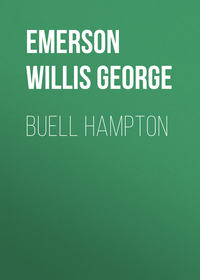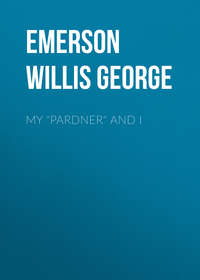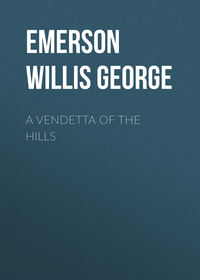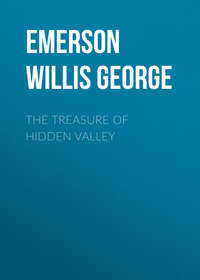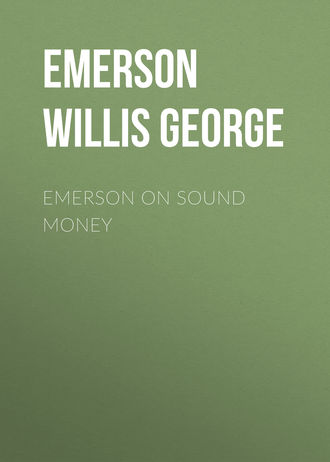 полная версия
полная версияEmerson on Sound Money

Willis George Emerson
Emerson on Sound Money / A Speech, 1896
SPEECH OF HON. WILLIS GEORGE EMERSON,
Lockerby Hall, Grand Rapids, Michigan.
October 29, 1896.
Mr. Chairman, Ladies and Gentlemen – I am indeed pleased to meet such a magnificent audience in this manufacturing city of Grand Rapids, noted from ocean to ocean for her culture, commerce and progress. Especially am I pleased to speak in your city in behalf of sound money, protection and reciprocity, under the auspices of the Young Men's Republican Club. I bring you greeting from the state of Illinois, and promise you that she will give a majority of 150,000 on next Tuesday for William McKinley. I am proud to hail from the grand old state of Illinois – a state that gave to our common country in the darkest days of our nation's history, Logan, that matchless civilian general; gave the unconquerable Grant, the tanner from Galena, and offered up as a holy sacrifice the "rail-splitter" president from the Sangamon bottoms – Abraham Lincoln. But to-night I remember that I am in the state of Michigan – magnificent commonwealth – almost illimitable in her resources, unconquerable in her courage, phenomenal in her progress, invincible in her pluck, unswerving in her patriotism, the home of the gallant Alger, and the former abode of that matchless statesman and patriot – the gifted Zach Chandler. Fellow citizens, we are in the closing days of the most momentous political campaign ever witnessed in our common country. He who would question the sincerity or honesty of a political opponent's views in this crusade must for the time being forget the school house on the hill and the high plain of intelligence of American citizenship.
KNOWS "COIN" HARVEY
Hon. W. H. Harvey, author of Coin's Financial School, is a gentleman I have known for many years, and for as many years as we have known each other, we have been warm personal friends. Toward the man I entertain the greatest respect; toward his theories I regard them as idle, visionary sophistries as unstable as "the house that was built upon sand." The student who really gives thought to the financial question will early discover that Coin's Financial School rests upon a false foundation and the superstructure must surely fall when beat against by the irresistable and truth capped waves of facts and history. No better answer can be given to these misleading and false theories than a plain, truthful statement of our coinage laws and the effect of legislation relating thereto. Fellow citizens, whatever else we may be, we are all Americans, either by birth or adoption; we respect and love the same flag and the undying principles which it represents. We do not differ in a desire for good government. We may differ and differ widely, however, in our opinions and ideas as to what laws will insure the greatest blessings to the people of this nation. Fortunately for the Republican party the American people are a reading and a thinking people, and the problems of the present campaign are now on trial before a jury of 70,000,000 of honest peers, not one of whom am I willing to believe would wantonly strike down the flag of our country, or any of its cherished institutions.
THE PEOPLE A JURY
This audience is a part of that great jury, who, after the evidence is all in, will decide one way or the other, with an avalanche of snowy ballots, as spotless in their purity as the honest hearts of the voters who cast the verdict into the ballot boxes. As Americans we are justly proud of our birthright – proud of the air of freedom that kisses the stars and stripes – our nation's ensign, emblematical of mighty victories in the past, a guarantee of protection in the present to all who stand beneath its folds and laden with rich promises of future prosperity. Our country is greater than the men whose election it is our pleasure to advocate. It is not men but measures which we are to consider. An earnest conscientious desire to investigate and determine the right, should absorb and thrill the heart of every patriotic American voter. The great parties in the present campaign do not differ so much in regard to the amount of money as they do in regard to its quality. "It is not the medium of exchange so much as it is an active exchange of the medium itself." On the tariff question we do not differ in schedules, but principles – principles which we, as republicans believe, involve the welfare of all our people and the prosperity of all classes. Personally I have every respect for a conscientious, earnest opponent in this crusade of education, and while honestly differing from them, yet will endeavor to wound the feelings of none. If I speak bitterly of doctrines which I believe to be pernicious in theory and ruinous in practice, do me the justice of not interpreting my remarks as in any sense personal.
MORAL QUESTIONS INVOLVED
Fellow citizens, this is a campaign embracing both political and moral questions. It is a political conflict, which the people will sooner or later acknowledge, to be one of patriotism. A moral conflict, which they will acknowledge to be indeed sublime.
WE MUST NOT FORGET THAT PATRIOTISM IN TIME OF PEACE IS A SCARCER ARTICLE THAN IN TIMES OF WAR.
In the guise of citizens men like "Coin" Harvey are attempting ignorantly or otherwise to undermine and overthrow our nation's honor and credit, and it is these alone that can perpetuate our liberties and insure us prosperity.
THE REPUBLICAN PARTY COMES BEFORE THE AMERICAN PEOPLE ADVOCATING THE MAINTENANCE OF THE GOLD STANDARD AND THE USE OF SILVER AS MONEY, IN THE LARGEST VOLUME POSSIBLE, CONSISTENT WITH SAFETY; ADVOCATING THE MAINTENANCE OF OUR NATION'S HONOR AND CREDIT; ADVOCATING A TARIFF, NOT FOR REVENUE ONLY, BUT A PROTECTIVE TARIFF THAT WILL ENCOURAGE DOMESTIC INDUSTRIES AND GIVE EMPLOYMENT TO ALL OUR PEOPLE; ADVOCATING RECIPROCITY.
A DOCTRINE WHICH WILL OPEN AN UNLIMITED MARKET FOR THE AMERICAN FARM AND THE AMERICAN FACTORY A DOCTRINE BEQUEATHED TO THIS GENERATION BY THE NOW SAINTED JAMES G. BLAINE.
Upon these issues the Republican party comes confidentially to the people, asking for their suffrage, appealing not to their prejudice but to their reason, not to their passions, but to their judgment. In this holy crusade we are lead by that valiant champion of the people's rights, "that advance agent of prosperity," Maj. William McKinley. On the other hand we find the Bryanized democrats, populists, and believers in Coin's Financial School arrayed in a solid phalanx against these cherished principles which we so ardently believe in.
WILSON LAW CLOSED FACTORIES
The repeal of the McKinley law in 1893 closed down factories and manufactories by the hundred and deprived tens of thousands of American workmen of employment.
UNDER THE OPERATIONS OF THE MCKINLEY LAW THE WAGE EARNERS OF THE UNITED STATES WERE RECEIVING EVERY SATURDAY NIGHT A LITTLE OVER $41,000,000. UNDER THE OPERATION OF THE WILSON LAW THEY ARE RECEIVING A LITTLE LESS THAN $19,000,000 AS A SATURDAY NIGHT PAY ROLL, A FALLING OFF OF OVER $22,000,000 PER WEEK TO THE WAGE EARNERS OF THIS COUNTRY.
If you ask me what has been the most unfortunate and appalling result of this wonderfully shrunken pay roll, I will answer by saying that American workingmen by the thousands have lost the roof that covered their heads for themselves and families, have been turned into the highways and are beggars to-day in the most unfortunate sense of the word. The questions of free trade and protection however, have practically been relegated into the background this year, and the sixteen-headed monster of free silver pushed to the front.
FELLOW CITIZENS, FREE TRADE AND FREE SILVER ARE TWIN SISTERS OF INFAMY, THE ASSERTIONS OF MR. HARVEY TO THE CONTRARY NOTWITHSTANDING.
It was the province of the Republican party four years ago to send forth its protests and warnings against free trade, and to-day with equal vehemence it is sending forth its warnings against destroying the high standard of our nation's finance, and reducing this country to a second class basis of silver monometallism.
BREAD AND BUTTER THE ISSUE
FELLOW CITIZENS, THE PAPER ISSUE IN THIS CAMPAIGN IS ONE OF FINANCE, BUT THE REAL ISSUE IS ONE OF BREAD AND BUTTER. FREE TRADE DURING THE LAST THREE YEARS HAS PAUPERIZED ITS TENS OF THOUSANDS, BUT THIS FREE SILVER CRAZE, IF PLACED UPON OUR STATUTE BOOKS, WILL PAUPERIZE ITS HUNDREDS OF THOUSANDS.
My friends, I believe, and believe most earnestly, with every throb of my heart, that in the present campaign the Republican party is the only true friend silver has. We seek to elevate the silver dollar, our opponents seek to debase it. The Republican party has provided a redeemer for every silver dollar. Our opponents seek to destroy and alienate this redeemer. If the silver dollar was not exchangeable with gold, it would not be worth any more than a Mexican dollar, or not as much, for there is less silver in it. Coin's Financial School and free silver advocates generally, have much to say about the money of the constitution. Let me say to you, the money of the constitution was based upon the relative market value of the two metals. The history of the last 404 years, from 1492 to 1896, is replete with evidence proving beyond the question of a doubt that the relative or market value of these metals is continually changing. When Columbus discovered America in 1492, ten ounces of silver would purchase one ounce of gold; when the Pilgrim Fathers landed on the rocky and barren coast of New England in 1620, thirteen ounces of silver would purchase one ounce of gold; in 1792 fifteen ounces of silver would purchase one ounce of gold. In 1873 one ounce of gold would not purchase sixteen ounces of silver. To-day one ounce of gold will purchase almost thirty-two ounces of silver.
THIS FLUCTUATION OF VALUES OF THE TWO METALS IS CONTROLLED, NOT BY LAWS WE SPREAD UPON OUR STATUTE BOOKS, BUT BY THE LAW OF SUPPLY AND DEMAND, GOVERNED BY THE COST OF PRODUCTION.
JACKSON AND JEFFERSON
The patriotism and statesmanship of Andrew Jackson and Thomas Jefferson were untainted in 1792 by the dangerous influence of a coterie of silver barons. They simply ascertained as nearly as they could the relative or market value of the two metals, and determined the legal from the commercial ratio, placed them side by side and started our mints going with the unlimited coinage of gold and silver at the ratio of 15 to 1. As a matter of fact they had overvalued silver; that is to say, the gold dollar was worth 100 cents, but the silver dollar was only worth 98 cents. Now the rank and file of our forefathers cared very little about the discrepancy of the 2 cents on the dollars, but the money changers were abroad in the land in 1792, the same as they are in 1896, and whenever a gold coin came into their possession it was quietly retired from circulation. In other words, the cheaper money drove out of circulation the higher priced money, and as a result, we had silver as the only hard money currency circulating in this country from 1792 to 1834. Let me quote Thomas Jefferson's own words. In speaking of the ratio of the two metals, he says:
"THE PROPORTION BETWEEN THE VALUES OF GOLD AND SILVER IS A MERCANTILE PROBLEM ALTOGETHER."
What statement could be clearer and more concise than that? It being a mercantile problem, it of course was understood to be subject to fluctuation and change. Accordingly, in 1834 our forefathers concluded as their first attempt at a double standard had utterly failed in keeping the two metals circulating side by side as money, that they would change the ratio from 15 to 1 to 16 to 1, which they did. It seems this ratio undervalued silver, that is to say, the gold dollar was still worth 100 cents, but the silver dollar was worth from 102 to 103 cents. Gold at once became the hard money circulating medium in this country, silver the higher priced money, was entirely retired by the money changers, bullion dealers and silversmiths. This is another illustration where the cheaper money drove out of circulation the higher priced money.
GREENBACKS WERE CHEAP MONEY
In 1861 our country was engaged in civil war, and the greenbacks were issued as money, and were at once looked upon as a cheaper money than either gold or silver and immediately drove both gold and silver out of circulation and kept them out of circulation for seventeen years, or until we resumed specie payment in 1879. The history of these seventeen years is another instance where the cheaper money was victorious and drove out of circulation the higher priced money. Mr. Harvey no less than four times in his recent speech in this city gave the following definition of bimetallism: "Bimetallism is the right to use either of the two metals for money." This condensed answer bears about the same relation to the correct definition of bimetallism as the Boy Orator of the Platte compares with those intellectual giants whom he seeks to imitate, but without success, the immortal Washington and Lincoln. (Applause). Bimetallism as is understood in the discussion of our financial question, is the use of both gold and silver as money; both legal tender money, and the legal ratio between the two metals determined from the commercial ratio. Throughout Mr. Harvey's published works and lectures we find him affirming the false principle that money is a creature of law, and that by operation of law the commercial ratio between gold and silver can be made to conform with the legal ratio of 16 to 1. Let us follow the author of "Coin's Financial School" for a few moments, and see where this false principle will carry us.
TO-DAY THE COMMERCIAL RATIO BETWEEN SILVER AND GOLD IS ABOUT 32 TO 1. MR. HARVEY CLAIMS THAT IF HIS THEORIES ARE SPREAD UPON OUR STATUTE BOOKS THAT IN A VERY SHORT TIME THE COMMERCIAL RATIO WILL BE 16 TO 1. IF MR. HARVEY POSSESSES THE SUPERHUMAN POWER OF REDUCING THE VALUE OF GOLD ONE-HALF, OR DOUBLING THE PRICE OF SILVER, WHICHEVER YOU WILL, AND BRING THEM TO A COMMERCIAL PARITY AT 16 TO 1, THEN INDEED WOULD HE BE FALSE TO THE CITIZENS OF THIS REPUBLIC IF HE DID NOT ADD A LITTLE MORE POWER TO HIS "KEELEY-MOTOR" THEORY, (APPLAUSE) AND MAKE THE COMMERCIAL RATIO BETWEEN GOLD AND SILVER 15 TO 1, THE SAME AS IT WAS IN 1792, OR BETTER STILL, IF IT IS A BLESSING TO HUMANITY TO LOWER THE RATIO BETWEEN GOLD AND SILVER, THEN APPLY A LITTLE MORE OF THIS OCCULT POWER AND MAKE THE RATIO 13 TO 1, THE SAME AS IT WAS IN 1620, WHEN OUR ANCESTORS CAME OVER IN THE MAYFLOWER; OR APPLY THE SAME FORCE WITH RENEWED ENERGY AND BRING THE RATIO DOWN TO 10 TO 1, THE SAME AS IT WAS IN 1492. INDEED, IF THIS PRINCIPLE IS A BOON TO HUMANITY, AND HIS THEORIES ARE NOT FALSE, WHY NOT PUSH THE WORK ALONG AND MAKE THE RATIO BETWEEN GOLD AND SILVER 1 TO 1? (APPLAUSE.)
My fellow citizens, in following my friend Harvey, you are led into a labyrinth abounding with impossibilities and as impracticable as the theory of perpetual motion. When the earth is proven to be flat instead of a globe, when water runs up-hill, when the law of gravitation ceases to be operative, when the tail wags the dog and not the dog the tail, then, and not till then, may we seriously consider these perpetual motion, "Keeley Motor" theories of Mr. Harvey and other double standard advocates. (Great Applause). If we were unable to keep both metals circulating side by side when there was a slight discrepancy of only two or three cents in their intrinsic value, does any intelligent or sane man believe for a moment whether he is a student of Coin's Financial School or not, that if we throw open our mints to the free and unlimited coinage of 52-cent dollars, that they would not at once drive out of circulation the $630,000000 of gold, now constituting more than one-third of our circulating medium? If gold, so important a factor in our medium of exchange both at home and abroad, should retire before silver – the cheaper money (and the light of experience surely proves that it would) can any one doubt that we would at once go on to a silver basis? Can any one doubt that the $625,300,000 of silver now used as money in this country would not instantly be cut in two so far as its purchasing power is concerned – that is, shrink from 100 cents, its face or nominal value, to 52 cents, its bullion value? In the light of past experience it would surely be a sad commentary on our intelligence as an enlightened nation, if we had learned nothing in 100 years. If the illustrious Hamilton and Jefferson were alive, they would, by pursuing the same policy which actuated them in determining the money of the constitution, fix the ratio to-day at about 32 to 1, simply because the relative or market value of the two metals has varied to that extent.
HONESTY AND SOBER JUDGMENT NEEDED
My countrymen, the questions involved in the present campaign merit and deserve your most careful thought and study. It is the sober, honest judgment of the thinking, reading, investigating American citizen that the Republican party is relying upon for its support. Let me give you a few facts which possibly you will consider worthy of remembrance:
FIRST. EVERY FREE AND UNLIMITED COINAGE COUNTRY IN THE WORLD IS ON A SILVER BASIS.
SECOND. THERE IS NOT A GOLD STANDARD COUNTRY ON EARTH BUT WHAT USES BOTH GOLD AND SILVER AS MONEY.
THIRD. THERE IS NOT A SILVER STANDARD COUNTRY IN THE WORLD THAT USES ANY GOLD WHATEVER AS MONEY; AND LASTLY, THERE IS NOT A SILVER STANDARD COUNTRY TO BE FOUND IN THE GREAT OCEAN OF COMMERCE THAT ROLLS ALL 'ROUND THE WORLD THAT HAS ONE-FOURTH AS MUCH MONEY PER CAPITA AS HAS THE UNITED STATES AND OTHER GOLD STANDARD COUNTRIES.
China, Japan, India, Mexico and most of the South American states are on a silver basis. The United States, England, France, Germany, Belgium, Sweden and others are on a gold basis.
One of the most interesting facts which the student of finance will encounter, is the vast difference of the amount of money per capita between the gold standard and the silver standard countries.
PER CAPITA OF MONEY
In the countries on a silver basis we find the Central American states with a per capita of $3.78, Japan with a per capita of only $4.09, India $3.33, China $2.08, Mexico $5.47. Now note the difference between these countries and a few that I will mention that are on a gold basis:
The United States has a per capita of $21.10, England $19.98, France $36.70, Germany $18.78, Belgium $27.82.
In this connection, fellow citizens, let me impress upon your minds the facts that you cannot go into any country on the face of the earth where its mints are open to free and unlimited coinage of silver and find a single gold coin circulating among the people, moreover, that the silver standard country does not exist where the United States gold dollar, the United States silver dollar, or the United States paper dollar will not purchase twice as much merchandise as any dollar which you can find circulating among its people. I challenge the author of Coin's Financial School or the Demosthenes of Nebraska, William Jennings Bryan, or any one else, to successfully contradict this statement.
I AM A BIMETALLIST
Personally, I am a bimetallist, and confidentially believe the republican party, guided by its wisdom and patriotism, will during the McKinley administration, devise ways and means by international agreement of autimatically adjusting the unsolved problem of true bimetallism, and keep both gold and silver on a parity at some given ratio. Silver will then be lifted from its place as one of the commodities of the earth and dignified as money, side by side with gold. To-day, I am a bimetallist, an ardent and devoted one, in the sense that I desire to see both gold and silver circulating side by side as money, and in the sense that we can have a greater per capita of money in this country by using both gold and silver as currency, than we possibly could by driving gold out of circulation, but fellow citizens, I disbelieve utterly in the possibility of a double standard. The phrase, "double standard" is a contradiction of terms. Standard means "correct measure," and you cannot have two different correct measures of value any more than you can have two different correct yard sticks, or two different correct results from a mathematical problem, or two different correct cyclometers on a bicycle. It one is right the other is wrong, and that is all there is to it. England tried the imaginary double standard for 470 years, and never succeeded in keeping the two metals circulating side by side, and finally gave it up as an utter failure. France with all the ingenuity of her inventive people, changed the ratio of gold and silver 118 times in twelve years in trying to balance on the double standard tight rope. We commenced trying it in 1792, and went on to a silver basis and remained there for 42 years, or until we changed the ratio from 15 to 1, to 16 to 1, in 1834. This change of ratio placed us on a gold basis, where we remained for a number of years. In 1861 we went on a paper basis and remained there for a number of years, and finally went back on to a gold basis in the common accepted understanding of the question, where we have since remained and the progress and prosperity of the United States during the last third of a century has been without a precedent in the history of the civilized world, and yet, I believe with my whole heart, that in the evolution of this financial question, hastened on by agitation, a plain of understanding will be reached higher and beyond that which has ever heretofore obtained in any of the civilized nations of the earth, and it will come through deliberations and councils in the republican party – the party of progress – and when it comes it will lighten the burdens and bless humanity.
THE CRIME OF '73
Mr. Harvey and all silver advocates talk to us about the crime of 1873. Let me say here and now there was no crime committed in 1873, directly or indirectly.
IF THERE WAS A CRIME COMMITTED, SENATORS JONES AND STEWART OF NEVADA, THE PRESENT HIGH PRIESTS IN THE SILVER MOVEMENT WERE THE CHIEF CONSPIRATORS, FOR THEN, AS NOW, THEY WERE AMONG THE LARGEST SILVER MINE OWNERS IN THE UNITED STATES, AND THEY VOTED FOR THE BILL.
Prior to 1873 we had coined in this country, all told, about 8,000000 of silver dollars, since 1873 we have coined up to January 1st, 1896, $547 914,340 of silver, about $426,000,000 of which are standard dollars. Since January 1st, 1896, we have coined over $13,000,000 of standard dollars. During last August we coined 2,650,000 of silver dollars, and the profit to the government – the people – was between $800,000 and $900,000.
WEBSTER SAYS: "DEMONETIZATION IS TO DEPRIVE OF VALUE, OR TO WITHDRAW FROM USE AS CURRENCY."
Does it look very much as though we had withdrawn silver from use as currency? In what way have we deprived silver of value? It is a full legal tender for all debts, public and private, and without limit as to amount, and has been for the last eighteen years. These, fellow citizens, are facts which you will not find within the covers of "Coin" Harvey's books, it looks as though we had added value to it, since the silver dollar circulates side by side with the gold dollar, notwithstanding its bullion value is 48 cents less than its nominal or face value.
CONSISTENT FRIEND OF SILVER
THE REPUBLICAN PARTY HAS EVER BEEN THE CONSISTENT FRIEND OF SILVER AND TO-DAY IS IRREVOCABLY COMMITTED TO THE DOCTRINE OF INTERNATIONAL BIMETALLISM, BUT IS UNALTERABLY OPPOSED TO SILVER MONOMETALLISM.
For one, I am not willing to see all the gold in this country driven out of circulation and the purchasing power of silver reduced to its bullion value. In other words, I am not ready to see the per capita of money in this country reduced fully one-half and our nation doing business on a Mexicanized silver basis. Wages are the last schedule to advance, and as fully 95 per cent, of the male adults in the United States are wage, salary or fee earners, there would be almost universal want, misery and suffering bequeathed to these people, because of such a reckless, unpatriotic and unbusiness-like experiment. What party then is the real friend of silver? The party that is trying to maintain the parity of the two metals, or the party that is protesting friendship in unstinted terms and yet committed to the folly of reducing silver to its bullion value? Fellow citizens the proposition in a nutshell is this:


